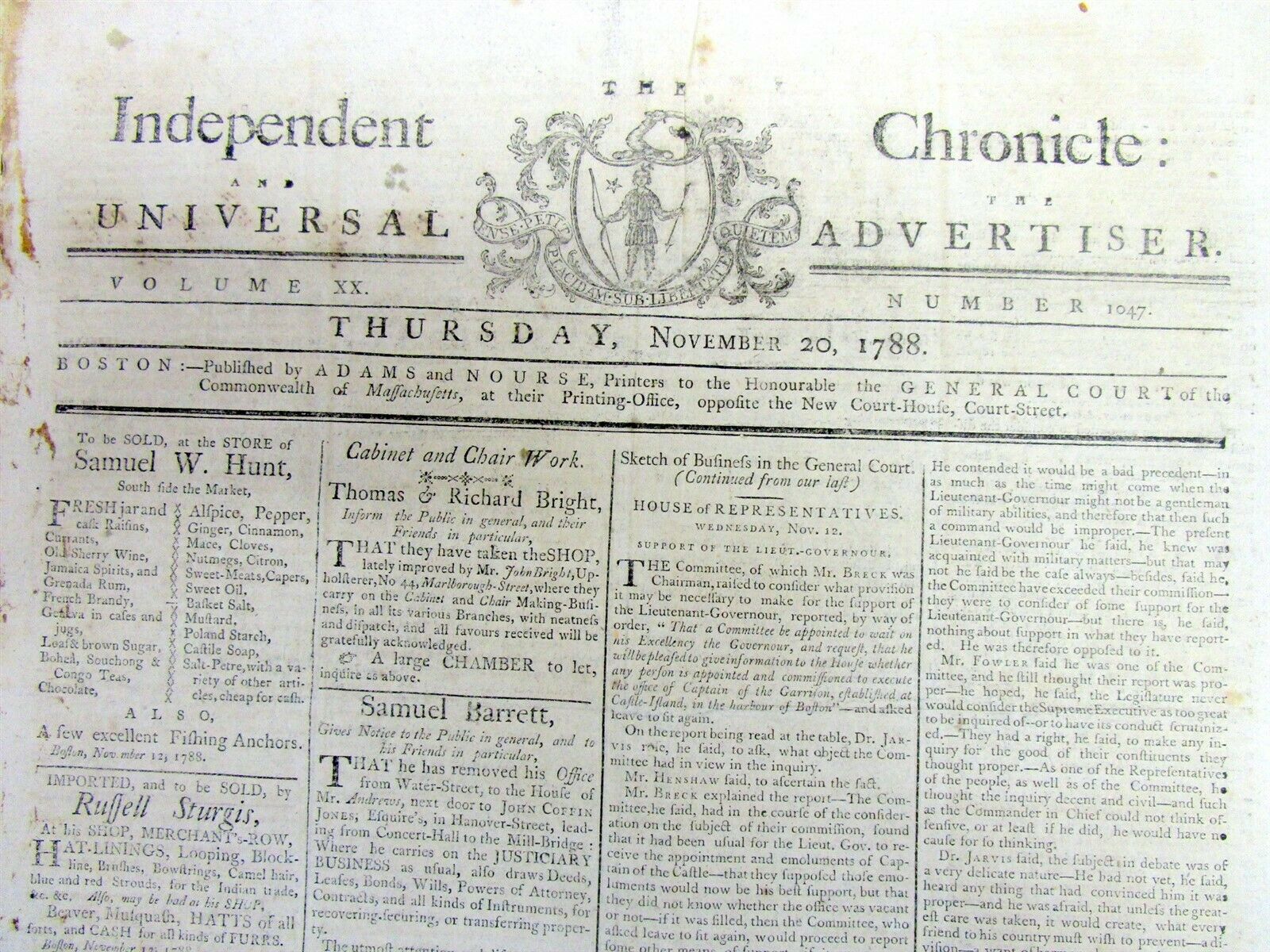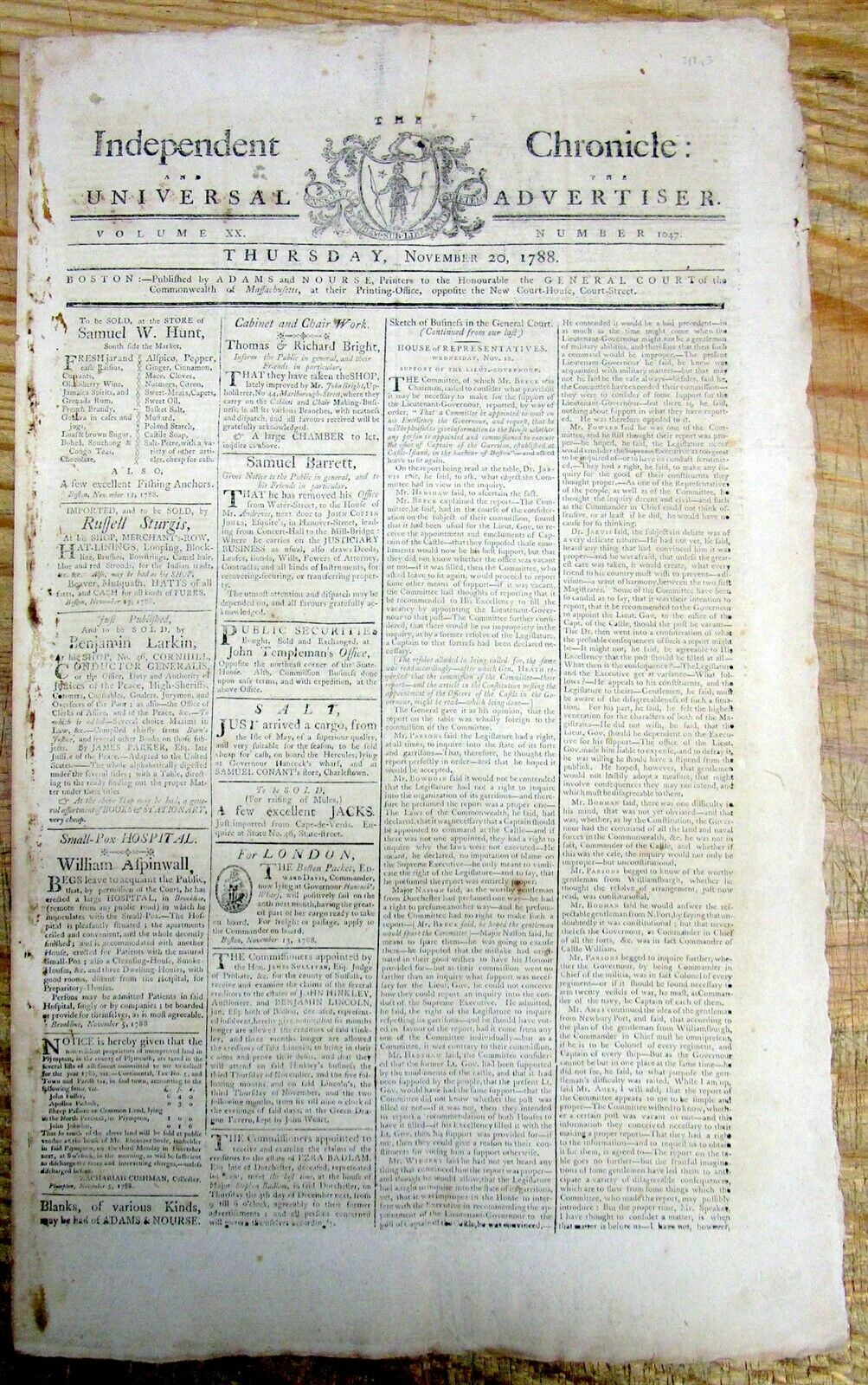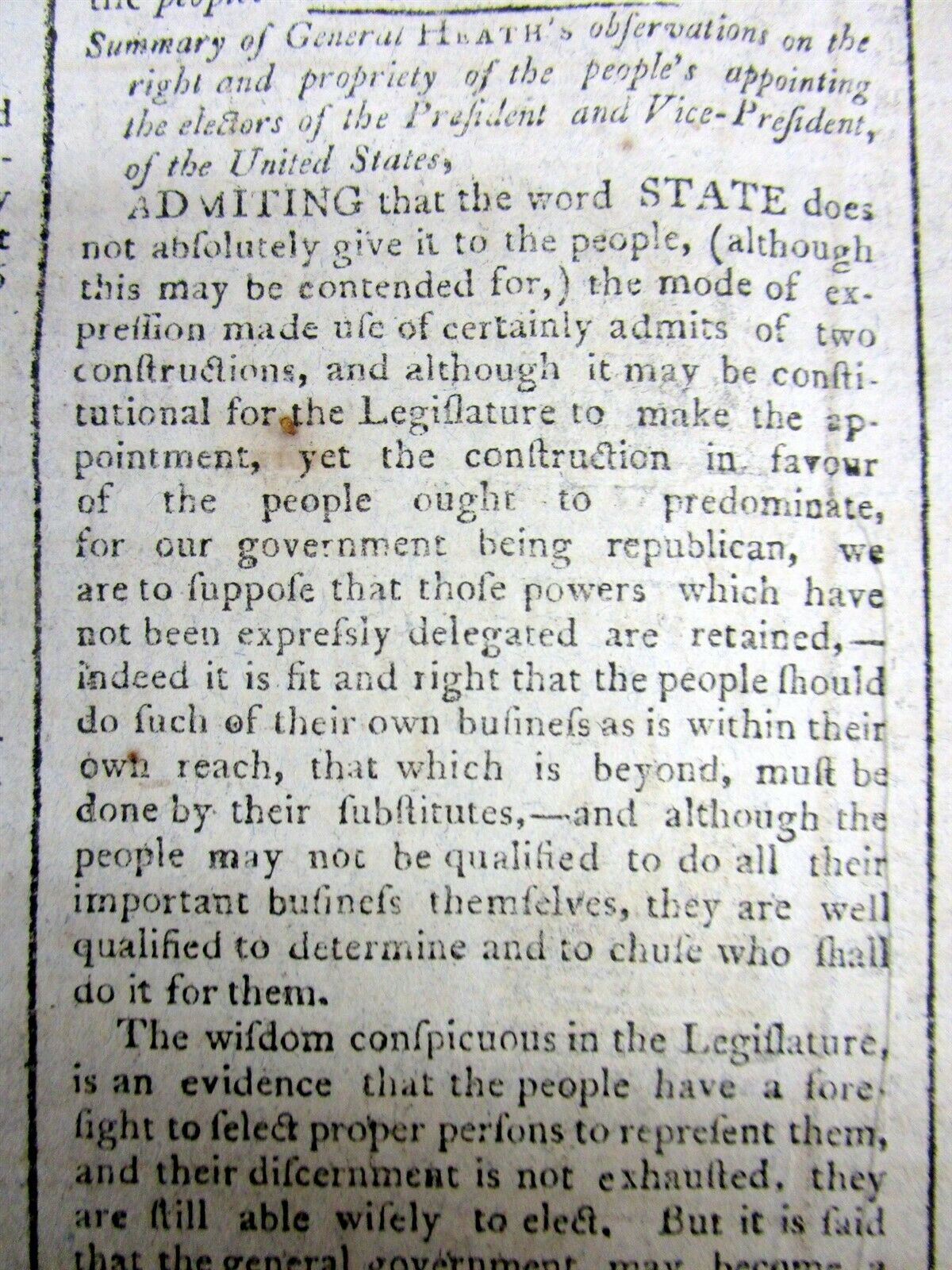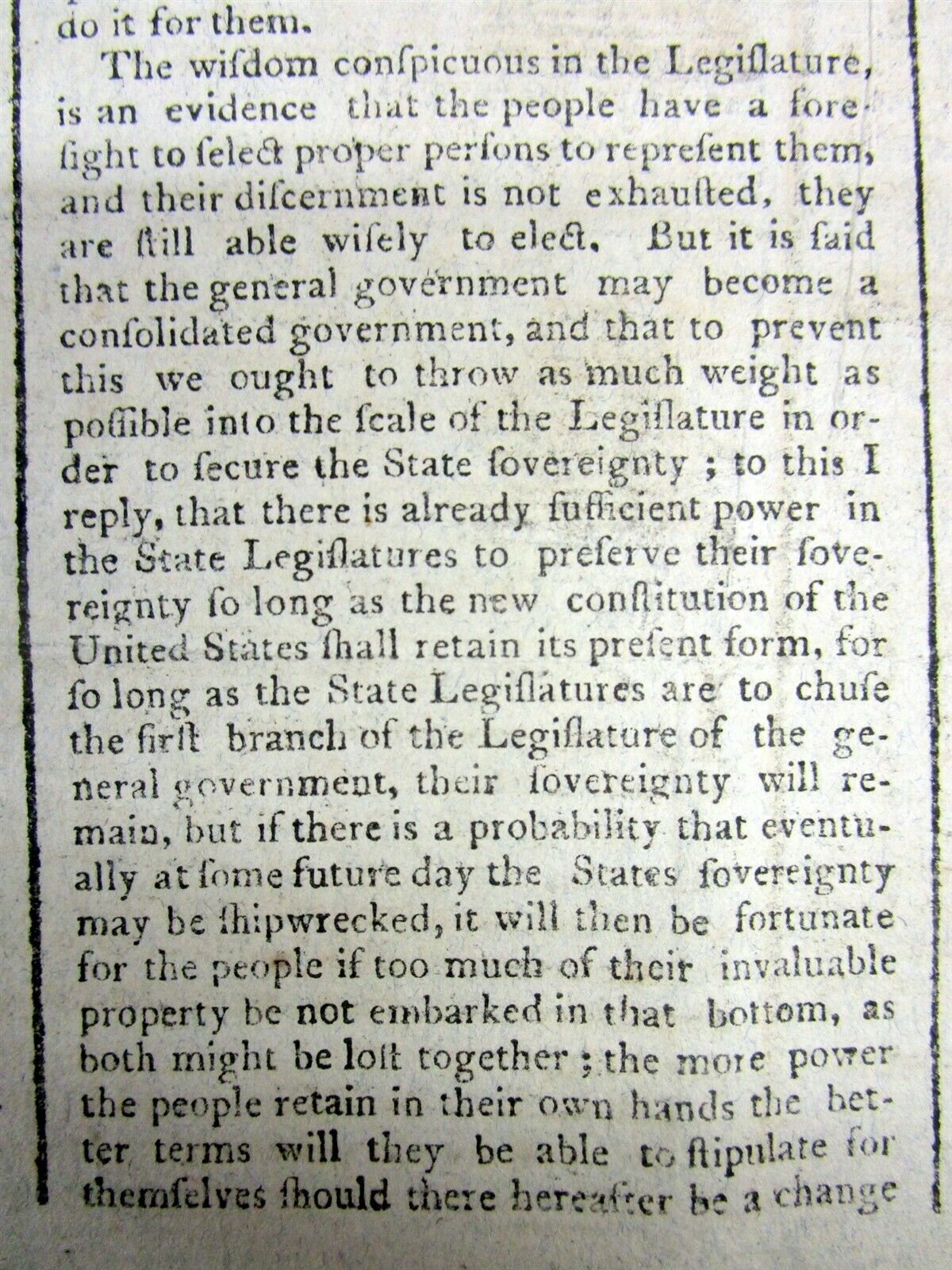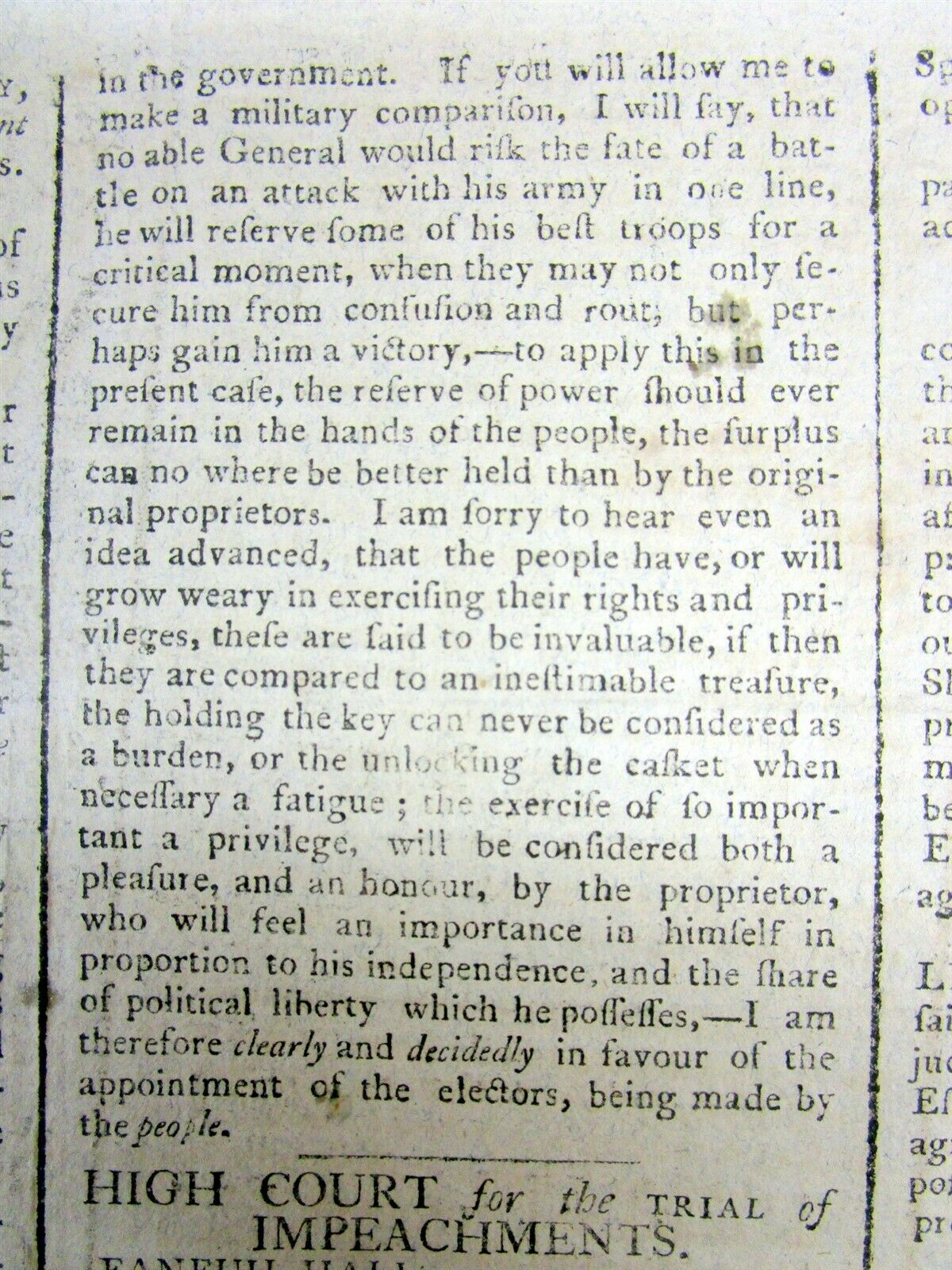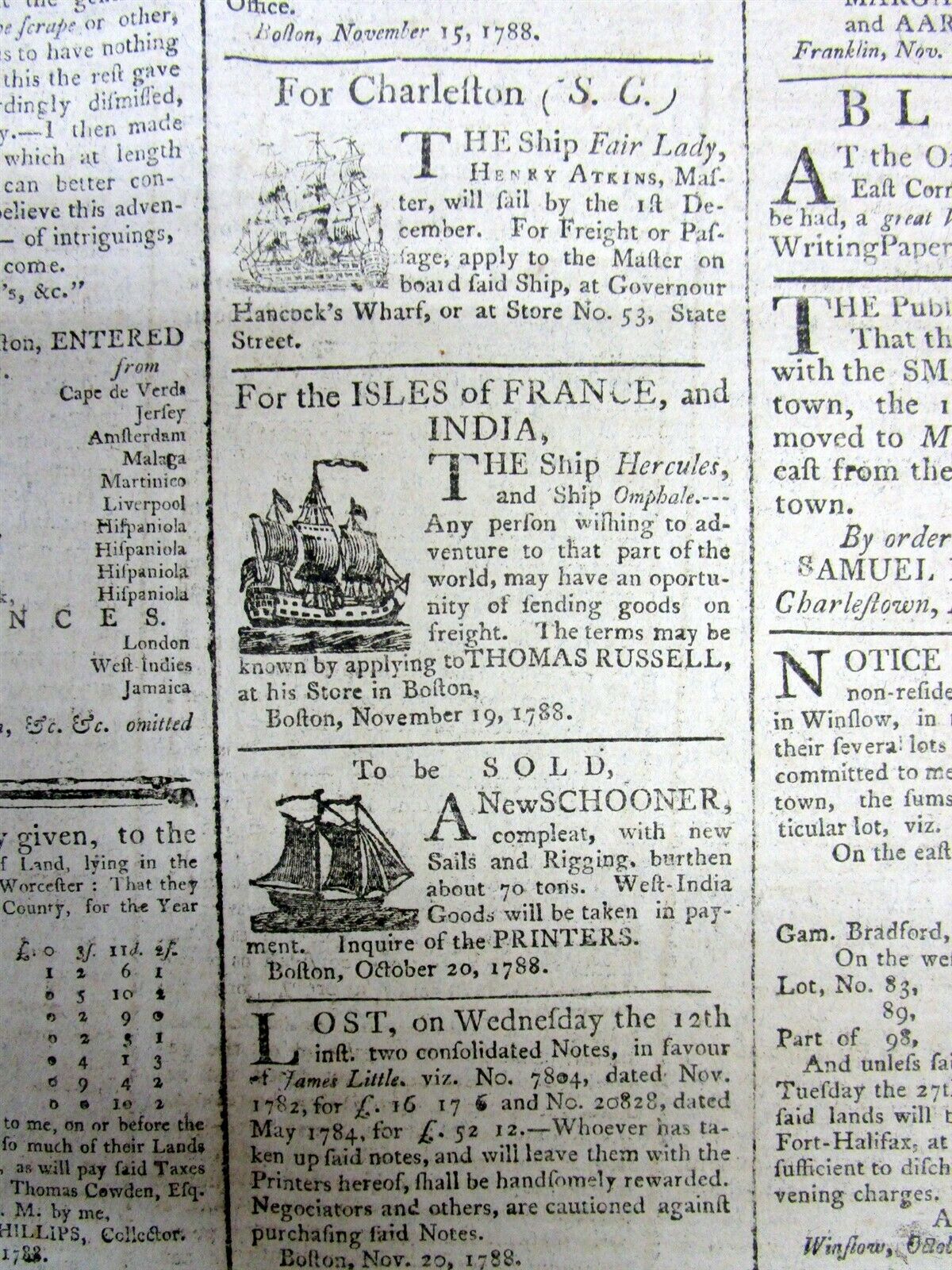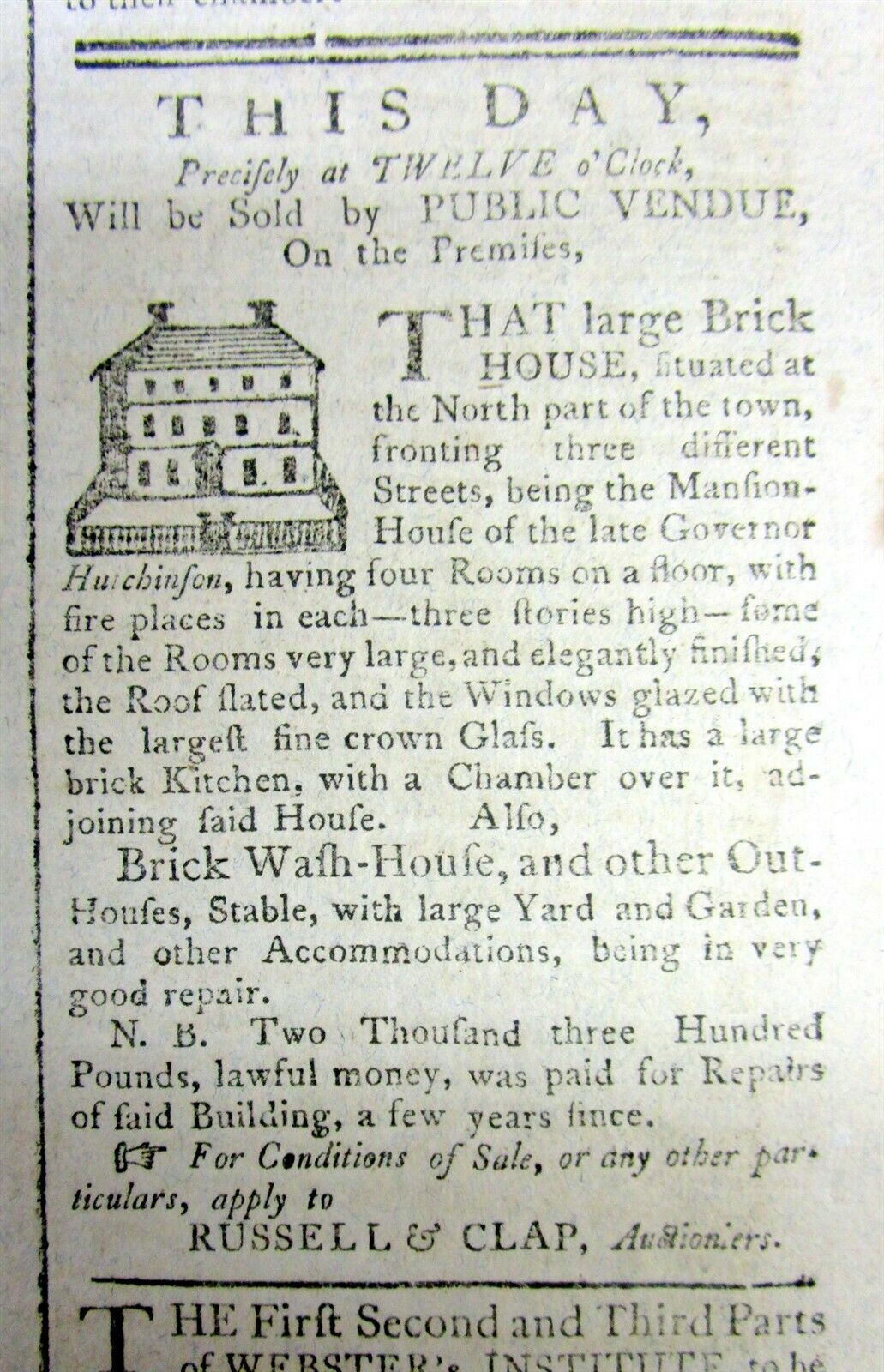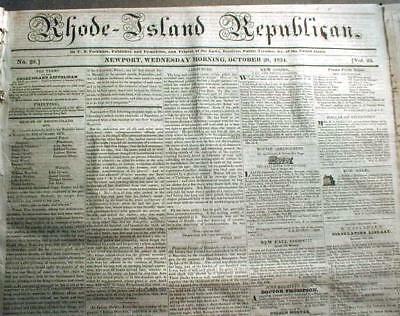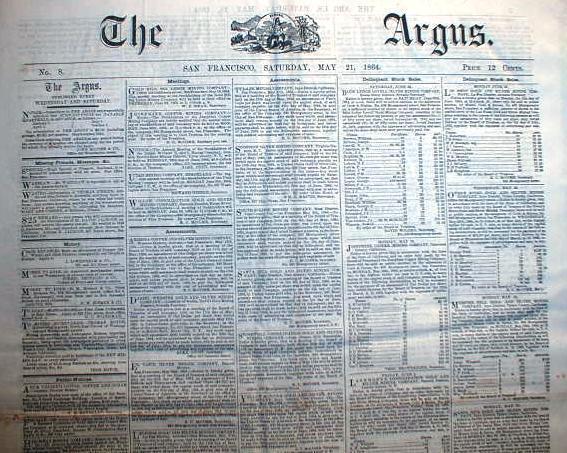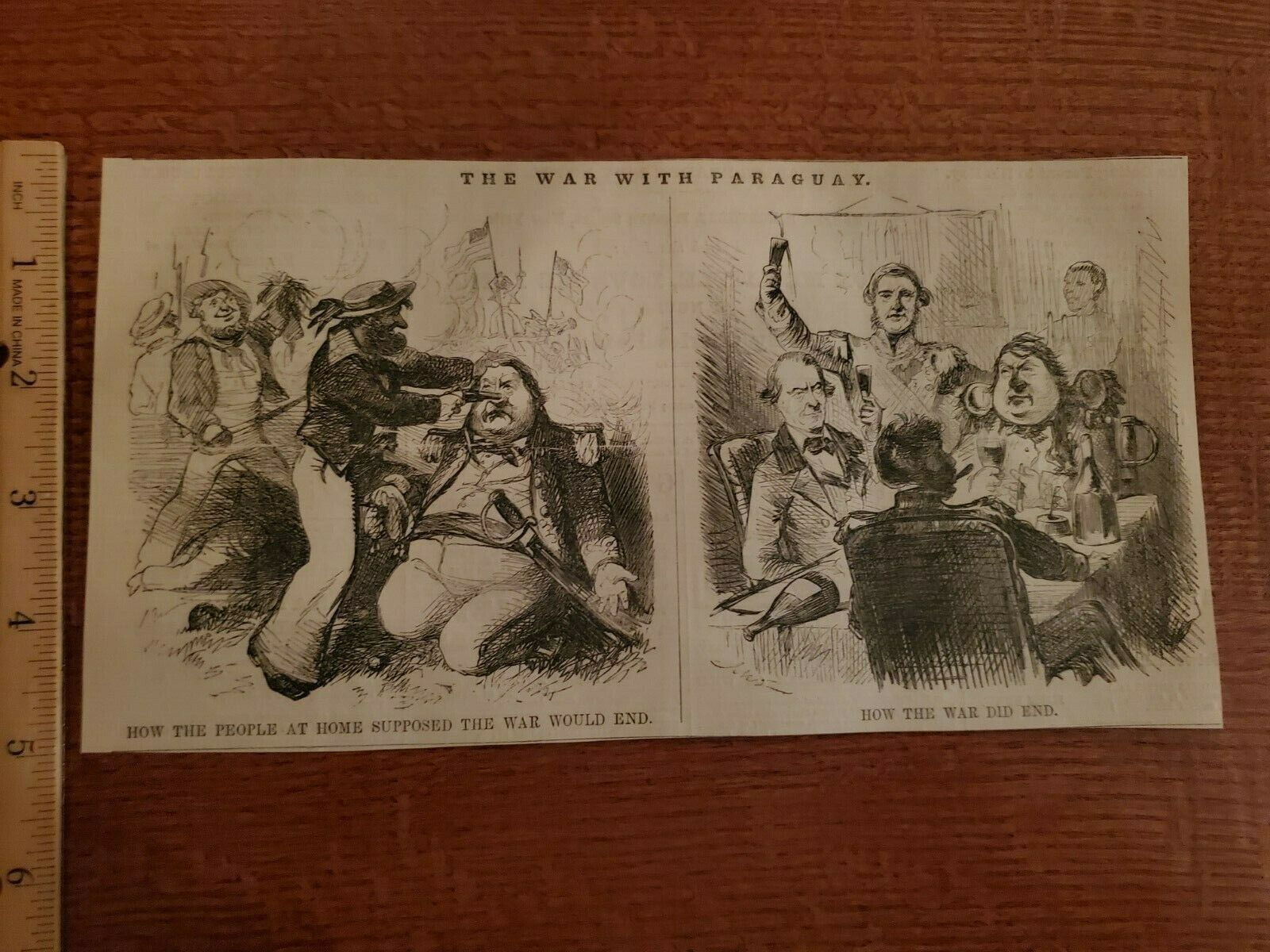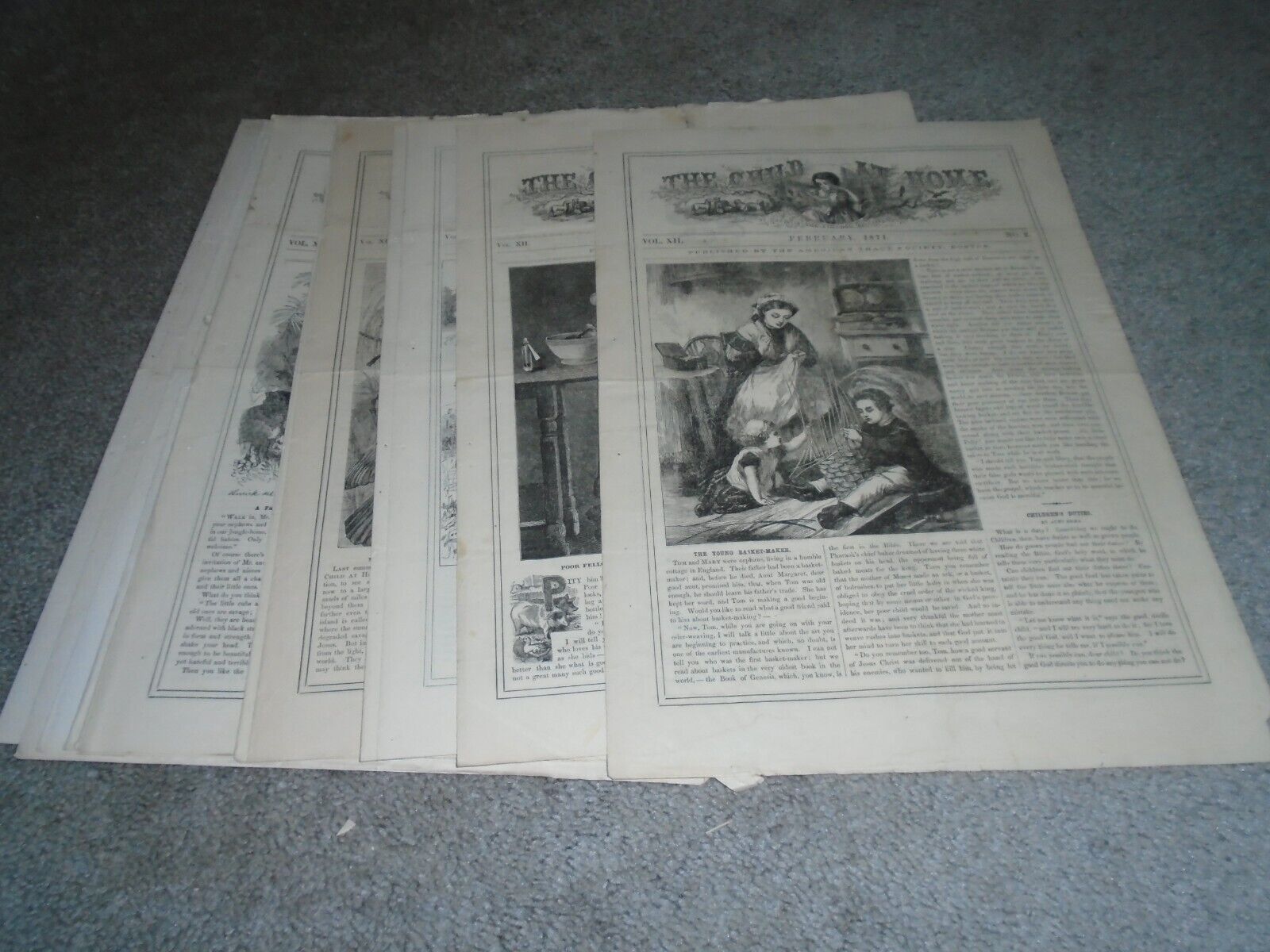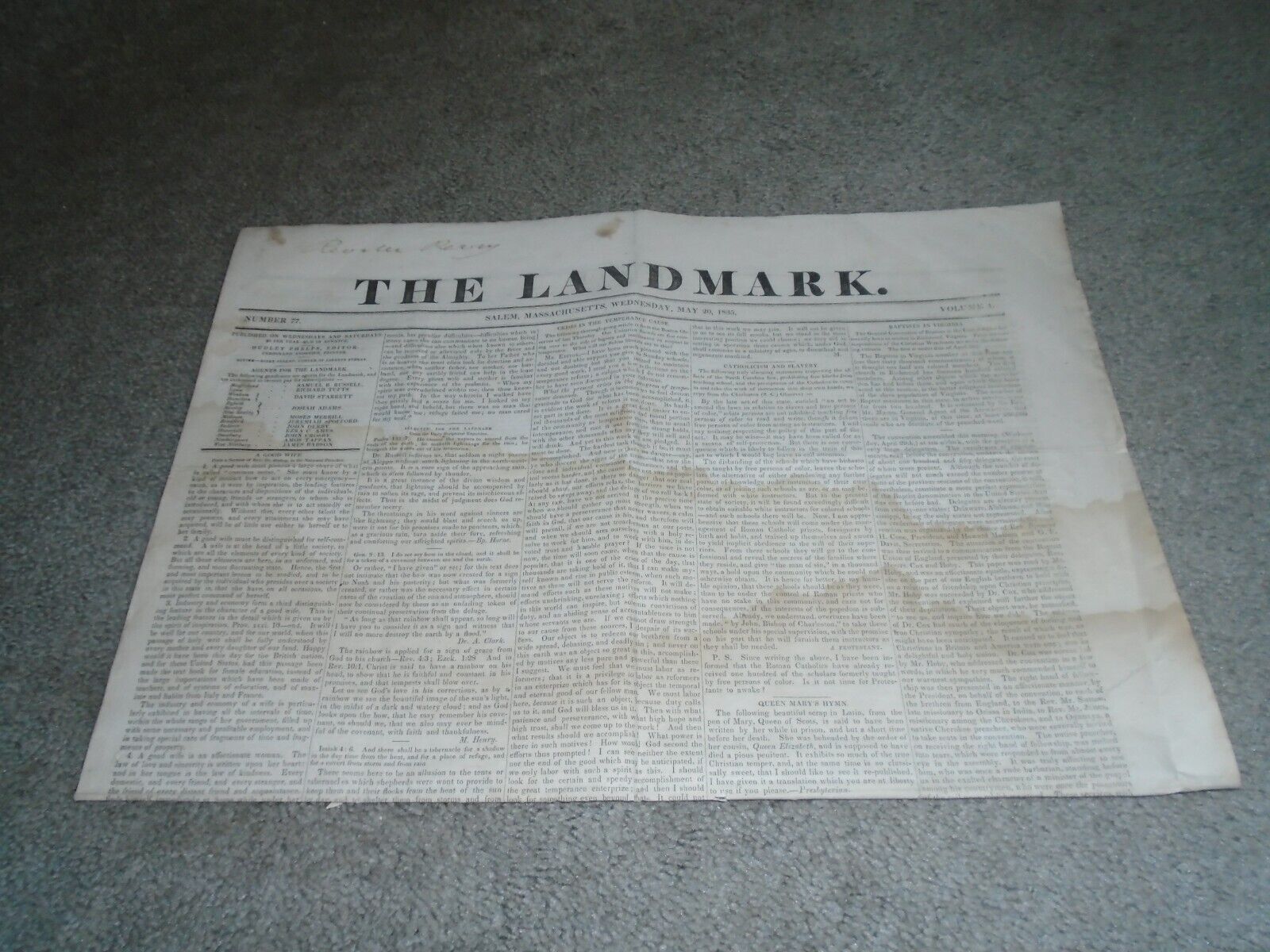-40%
1788 newspaper w Long ESSAY Role of the ELECTORAL COLLEGE in PRESIDENT ELECTIONS
$ 132
- Description
- Size Guide
Description
1788 newspaper w Long ESSAY Role of the ELECTORAL COLLEGE in PRESIDENT ELECTIONS1788 newspaper with a Long detailed ESSAY on the Role & Need of the ELECTORAL COLLEGE in PRESIDENTIAL ELECTIONS
- inv # 7K-235
Please visit our
EBAY STORE
for THOUSANDS MORE HISTORICAL NEWSPAPERS for SALE or at auction
SEE PHOTO(s) - COMPLETE ORIGINAL NEWSPAPER, the
Independent Chronicle and the Universal Advertiser
(Boston, MA) dated Nov 20, 1788. This original newspaper contains an inside page heading: "Summary of General Heath's observations on the propriety of the people's appointing the electors of the President and Vice President of the United States." This 2/3 column essay concerns the
propriety of the ELECTORAL COLLEGE to elect the US President and Vice President
, a subject that resonates to this very day, nearly 235 years later.
This is the EARLIEST discussion I have ever seen in a contemporary newspaper of the propriety for the ELECTORAL COLLEGE !!!
The United States Electoral College is the group of presidential electors required by the Constitution to form every four years for the sole purpose of electing the president and vice president. Each state appoints electors according to its legislature, equal in number to its congressional delegation (senators and representatives). Federal office holders cannot be electors. Of the current 538 electors, an absolute majority of 270 or more electoral votes is required to elect the president and vice president. If no candidate achieves an absolute majority there, a contingent election is held by the United States House of Representatives to elect the president, and by the United States Senate to elect the vice president.
Initially, state legislatures chose the electors in many of the states. From the early 19th century, states progressively changed to selection by popular election. In 1824, there were six states in which electors were still legislatively appointed. By 1832, only South Carolina had not transitioned. Since 1880, electors in every state have been chosen based on a popular election held on Election Day. The popular election for electors means the president and vice president are in effect chosen through indirect election by the citizens.
Since the mid-19th century, when all electors have been popularly chosen, the Electoral College has elected the candidate who received the most (though not necessarily a majority) popular votes nationwide, except in four elections: 1876, 1888, 2000, and 2016. In 1824, when there were six states in which electors were legislatively appointed, rather than popularly elected, the true national popular vote is uncertain. The electors in 1824 failed to select a winning candidate, so the matter was decided by the House of Representatives.
Currently, the states and the District of Columbia hold a statewide or districtwide popular vote on Election Day in November to choose electors based upon how they have pledged to vote for president and vice president, with some state laws against faithless electors. All jurisdictions use a winner-take-all method to choose their electors, except for Maine and Nebraska, which choose one elector per congressional district and two electors for the ticket with the highest statewide vote. The electors meet and vote in December and the inauguration of the president and vice president takes place in January.
The appropriateness of the Electoral College system is a matter of ongoing debate. Supporters argue that it is a fundamental component of American federalism by preserving the constitutional role of the states in presidential elections, while critics note the role of slavery in the system's creation. Its implementation by the states may leave it open to criticism; winner-take-all systems, especially in populous states, may not align with the principle of "one person, one vote". Almost 10% of presidential elections under the system have not elected the winners of the nationwide popular vote.
Critics argue that the Electoral College system is less democratic than a direct popular vote and that the College violates the democratic principle of "one person, one vote." Thus, a president may be elected who did not win the national popular vote, as occurred in 1824, 1876, 1888, 2000, and 2016. Critics object to the inequity that due to the distribution of electors, individual citizens in states with smaller populations have proportionately more voting power than those in larger states. This is because the number of electors each state appoints is equal to the size of its congressional delegation, each state is entitled to at least three regardless of population, and the apportionment of the statutorily fixed number of the rest is only roughly proportional. In addition, faithless electors may not vote in accord with their pledge. Further objection is that instead of spending equally on each voter in the nation, candidates focus their campaigns on just a few swing states. While polling data show having a direct popular vote for presidential elections is consistently favored by a majority of Americans, the popularity of the Electoral College has hovered between 35 and 44% in the 21st century.
Very good condition. This listing includes the complete entire original newspaper, NOT just a clipping or a page of it. STEPHEN A. GOLDMAN HISTORICAL NEWSPAPERS stands behind all of the items that we sell with a no questions asked, money back guarantee. Every item we sell is an original newspaper printed on the date indicated at the beginning of its description. U.S. buyers pay priority mail postage which includes waterproof plastic and a heavy cardboard flat to protect the purchased item from damage in the mail. Upon request by the buyer, we can ship by USPS Media Mail to reduce postage cost; however, please be aware that USPS Media Mail can be very slow in its time of transit to the buyer. International postage is quoted when we are informed as to where the package is to be sent. We do combine postage (to reduce postage costs) for multiple purchases sent in the same package.
We list thousands of rare newspapers with dates from 1570 through 2004 on Ebay each week. This is truly SIX CENTURIES OF HISTORY that YOU CAN OWN!
Stephen A. Goldman Historical Newspapers has been in the business of buying and selling historical newspapers for over 50 years. Dr. Goldman is a consultant to the Freedom Forum Newseum and a member of the American Antiquarian Society. You can buy with confidence from us, knowing that we stand behind all of our historical items with a 100% money back guarantee. Let our 50+ years of experience work for YOU ! We have hundreds of thousands of historical newspapers (and their very early precursors) for sale.
Stephen A. Goldman Historical Newspapers
has been in the business of buying and selling historical newspapers for over 50 years. We are located in the charming Maryland Eastern Shore town of OXFORD, Maryland.
Dr. Goldman is a consultant to the Freedom Forum Newseum and a member of the American Antiquarian Society. You can buy with confidence from us, knowing that we stand behind all of our historical items with a 100% money back guarantee. Let our 50+ years of experience work for YOU ! We have hundreds of thousands of historical newspapers (and their very early precursors) for sale.
We invite customer requests for historical newspapers that are not yet located in our extensive Ebay listing of items. With an inventory of nearly a million historical newspapers (and their early precursors) we are likely have just the one
YOU
are searching for.
WE ARE ALSO ACTIVE BUYERS OF HISTORICAL NEWSPAPERS, including large and small personal collections, bound volumes, significant individual issues, or deaccessions from libraries and historical societies. IF YOU WANT TO SELL, WE WANT TO BUY !!!
Powered by SixBit's eCommerce Solution
